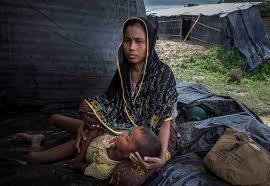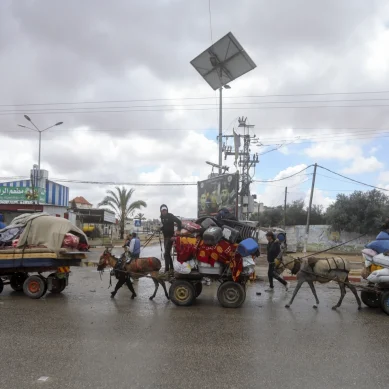
Before she fled Myanmar as a refugee, Rozina had worked for an NGO for seven years. Now, fear has gradually taken hold of her every evening, when the sun sets and the last aid worker jeep has rumbled out of the vast refugee camps. The refugees’ security, especially, is considered a luxury. They live at the mercy of criminals.
The security situation varies in each of the settlements’ 34 camps. It also changes over time; intimidation comes and goes in waves. In some camps, female aid workers report being told to pay “taxes” from their NGO job earnings, and payment receipts with ARSA’s logo circulate on social media. In others, the main goal appears to be stopping women from working. Supportive husbands and relatives of educated women have also been targeted.
Aid groups say the threats are disrupting programmes that are highly dependent on community volunteers. A March internal briefing by aid coordinators focused on gender issues said some teachers, health outreach volunteers and others have stopped working due to the “new wave of threats” and “severe forms of violence”.
Some changes are subtle. Ahead of International Women’s Day in March, for example, UN Women cancelled a billboard campaign that was to feature the faces of several women leaders.
“This might have otherwise unintentionally caused them harm,” said Flora Macula, head of UN Women in Cox’s Bazar. “But this doesn’t mean that we are scaling back our activities with women,” she added.
The internal briefing encourages aid groups to document threats and violence, help women with legal support and relocation if necessary, and to not replace female workers or accept that their rights are restricted.
One international aid worker said that when young women volunteers ask her organisation for help, she has to tell them that there’s nothing she can do to protect them. “We are powerless,” said the aid worker, who asked that neither she nor her organisation be identified.
Humanitarian groups are well aware of the threats to women, but they fear making the wrong decision, the aid worker said: They can’t protect female Rohingya workers, so employing them puts them in harm’s way; but not hiring women robs them of purpose and a rare source of income.
“We don’t know how to touch this, so we don’t,” she said.
Many Rohingya say the worsening insecurity is a key reason why thousands have volunteered to relocate to Bhasan Char, a disaster-prone island on the Bay of Bengal that rights groups call a floating jail.
Rohingya refused previous government attempts to transfer to the island, but some 19,000 people have relocated there since December. Mariam, the civil society activist, wanted to be one of them: She saw it as a way to escape harassment and threats in the mainland camps.
“If I go to Myanmar, there will be a problem. Here, there are problems,” she said. “I told my family, ‘let’s go to Bhasan Char,’ but they didn’t agree.”
Rights groups have urged authorities to boost security in the camps, especially at night. Aid groups say there must be “zero tolerance” when women or their families are threatened or harassed.
But some aid workers also worry that properly documenting the extent of the violence could push Bangladeshi authorities to raise already tight restrictions on the Rohingya.
Authorities have ringed some of the camps with watchtowers and barbed-wire fencing, which may have prevented Rohingya from running to safety during a massive fire that engulfed parts of four camps in March.
After the fire, Bangladesh’s home affairs minister said the fences were meant to contain “the worsening situation of law and order in the camps”.
“If Rohingya can be painted as terrorists, this could eventually be used as a good argument by the government why they should leave Bangladesh,” said a UN official, who asked not to be identified in order to speak freely.
Trying to shed light on the problem has also landed Rohingya in trouble. The New Humanitarian has spoken to refugees who fled into hiding after they were threatened for helping to research criminal activities in the camps.
“I said, ‘Even if you threaten to kill me, I will not stop speaking up.’”
“It has just become unbearable,” said Laila, an active member of Rohingya civil society who also asked that her name not be used.
“Even in conservative Saudi Arabia, there are women who are pilots,” she said.
A few months ago, Laila started receiving threatening voice messages after she called for women’s equality in an aid organisation’s video. Rather than quit her advocacy, however, she eventually decided to push back: “I said, ‘Even if you threaten to kill me, I will not stop speaking up.’”
Laila continues to share the video on social media. She hasn’t been bothered since.
“When someone is speaking courageously, they stop,” she said.
- The New Humanitarian report











